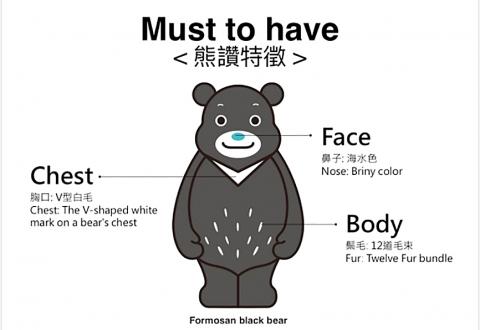The trademark registration for Matsu’s “blue tears” (藍眼淚) — a natural nighttime phenomenon of fluorescent blue patches caused by the algae Noctiluca scintillans that are visible from the shore from April to August — might be canceled, the Intellectual Property Office said yesterday.
The decision might be affected by the case of Bravo the Bear, the Taipei Summer Universiade mascot that has become a Taipei City Government mascot, whose appearance was mildly modified to be more distinguishable to gain trademark registration approval.
The city government applied for a trademark for the second version of Bravo in December last year and is likely to obtain it, but its Chinese name,xiong zan (熊讚), is a colloquial term that is ineligible for trademark protection, office Director-General Hong Shu-min (洪淑敏) said.

Photo: screen grab from Professional Technology Temple
Xiong zan is pronounced similarly to the Hoklo (commonly known as Taiwanese) word for “the best.”
If the name xiong zan cannot be registered, then how can “blue tears” receive a trademark, Democratic Progressive Party (DPP) Legislator Gao Jyh-peng (高志鵬) said.
It is inappropriate for “blue tears” to have word mark protection, Hong said, adding that the office would cancel its registration.
Lienchiang County Government documents showed that “blue tears” was registered for word mark protection, the office said, adding that it has notified the trademark’s owners that the registration would be canceled if they do not propose a solution.
It said word mark protection for “blue tears” was obtained by three people of the county government for usage on four types of products: pastries, tea leaves, popsicles and glass products.
They succeeded in obtaining trademark protection because they applied when the county government was eagerly promoting the “blue tears” for tourism purposes and the name was not yet protected, an office official said.
DPP Legislator Chuang Ruei-hsiung (莊瑞雄) said he is a victim of Bravo, because he used the homonymic term xiong zan (雄讚) for his campaign slogan, but now people only think of the mascot when they hear it.
He asked whether the office had intentionally made it hard for the Taipei City Government to obtain trademark protection for the mascot.
The first version of Bravo is a graphic design that already obtained trademark protection, while the application for the second version is being processed and is likely to succeed, Hong said, adding that the office did not delay the process or make it hard for the city government.
The newly modified appearance of Bravo, which features a distinctive ocean blue nose and white eyebrows, as well as the integration of the Chinese characters for Taipei into part of its name in Chinese, were officially launched at the Taipei International Flora Exposition Expo Dome yesterday.

A year-long renovation of Taipei’s Bangka Park (艋舺公園) began yesterday, as city workers fenced off the site and cleared out belongings left by homeless residents who had been living there. Despite protests from displaced residents, a city official defended the government’s relocation efforts, saying transitional housing has been offered. The renovation of the park in Taipei’s Wanhua District (萬華), near Longshan Temple (龍山寺), began at 9am yesterday, as about 20 homeless people packed their belongings and left after being asked to move by city personnel. Among them was a 90-year-old woman surnamed Wang (王), who last week said that she had no plans

China might accelerate its strategic actions toward Taiwan, the South China Sea and across the first island chain, after the US officially entered a military conflict with Iran, as Beijing would perceive Washington as incapable of fighting a two-front war, a military expert said yesterday. The US’ ongoing conflict with Iran is not merely an act of retaliation or a “delaying tactic,” but a strategic military campaign aimed at dismantling Tehran’s nuclear capabilities and reshaping the regional order in the Middle East, said National Defense University distinguished adjunct lecturer Holmes Liao (廖宏祥), former McDonnell Douglas Aerospace representative in Taiwan. If

TO BE APPEALED: The environment ministry said coal reduction goals had to be reached within two months, which was against the principle of legitimate expectation The Taipei High Administrative Court on Thursday ruled in favor of the Taichung Environmental Protection Bureau in its administrative litigation against the Ministry of Environment for the rescission of a NT$18 million fine (US$609,570) imposed by the bureau on the Taichung Power Plant in 2019 for alleged excess coal power generation. The bureau in November 2019 revised what it said was a “slip of the pen” in the text of the operating permit granted to the plant — which is run by Taiwan Power Co (Taipower) — in October 2017. The permit originally read: “reduce coal use by 40 percent from Jan.

‘SPEY’ REACTION: Beijing said its Eastern Theater Command ‘organized troops to monitor and guard the entire process’ of a Taiwan Strait transit China sent 74 warplanes toward Taiwan between late Thursday and early yesterday, 61 of which crossed the median line in the Taiwan Strait. It was not clear why so many planes were scrambled, said the Ministry of National Defense, which tabulated the flights. The aircraft were sent in two separate tranches, the ministry said. The Ministry of Foreign Affairs on Thursday “confirmed and welcomed” a transit by the British Royal Navy’s HMS Spey, a River-class offshore patrol vessel, through the Taiwan Strait a day earlier. The ship’s transit “once again [reaffirmed the Strait’s] status as international waters,” the foreign ministry said. “Such transits by